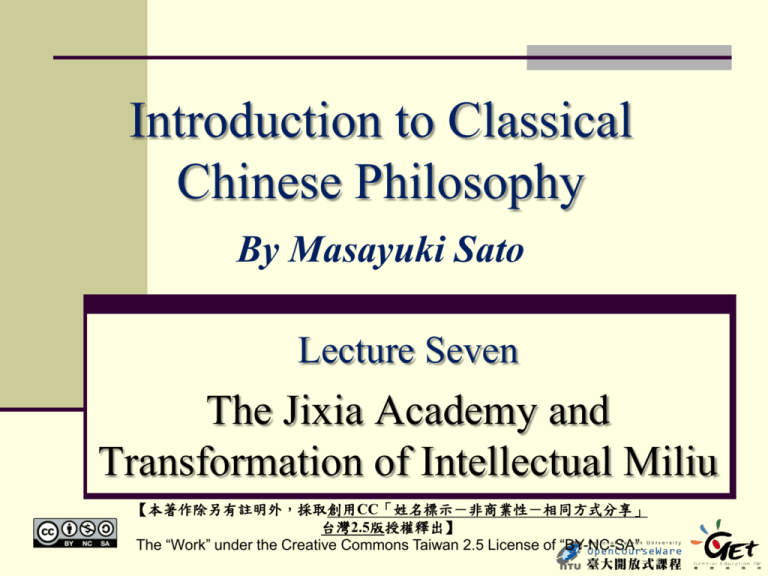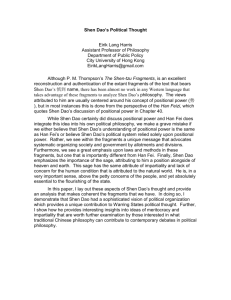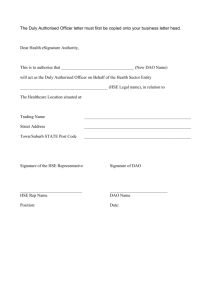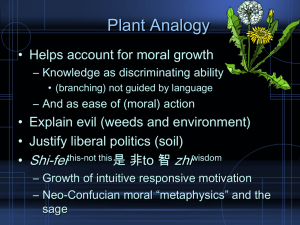下載講義
advertisement

Introduction to Classical Chinese Philosophy By Masayuki Sato Lecture Seven The Jixia Academy and Transformation of Intellectual Miliu 【本著作除另有註明外,採取創用CC「姓名標示-非商業性-相同方式分享」 台灣2.5版授權釋出】 The “Work” under the Creative Commons Taiwan 2.5 License of “BY-NC-SA”. Contents of Today’s Lecture 1/2 (1) Great transformation of the intellectual miliu during the Warring States period a) Historical background: Confucianism vs. Mohism b) Mencius’ involvement with civil war of the state of Yan c) Ethical argumentation → analytical Discourse Contents of Today’s Lecture 2/2 (2) Characteristics of Jixia Thought a) What is “Jixia Academy 稷下學宮” ? b) Inquiry into practical theory for attaining the order of a country rather than arguing the effect of morality c) Development of various theoretical terms Cf. fa 法, fen 分, gong 公, shi 勢 d) The cases of Tian Pian 田駢, Shen Dao 慎到 and Zou Yan 驟衍 (3) The Significance of the Jixia thought in the context of Chinese Intellectual thought Confucianism vs. Mohists Common characteristics Exaltation of the worthy Welfare of people Anti-aggressive war The overwhelming power of anthropomorphic concept of Heaven Importance of worship for Heaven and ancestral spirit Confucianism vs. Mohists Contradiction Pro-music vs. Anti-music Pro-funerals vs. Anti-funerals Different level of love vs. equal love to all Acceptance of fate vs. reject of fate Definition of the term “li 利” →Profit (Mencius) vs. Welfare of people A Reason of Advent of Analytical Discourse A plausible reason to explain why ethical discourse yielded to analytical discourse is that the confrontation between Confucians and Mohists about policy making caused, ironically, a deterioration in the living conditions of the ruled people. In the state of Yan, chief minister Zi Zhi 子 之was placed on the throne of Yan by King Kuai 燕王噲 because King Kuai believed that Zi Zhi was a sage. To go by evidence in the Hanfeizi, King Kuai seemed to practise Mohist policies. Strong opposition to Zi Zhi’s enthronement caused a devastating civil war. The Shiji maintains that Mencius, as visiting chancellor, persuaded the Qi king to “punish” (fa 伐) Yan. Qi’s Invasion into Yan and Mencius’ subtle “role” In the Mencius, although the description is much milder, we can read the text as saying that Mencius certainly gave the Qi court a positive answer about whether Qi could attack Yan or not. Consequently, the army of Qi marched on the capital of Yan. Reflecting on these historical facts, Mencius’ positive answer concerning Qi’s military intervention in the civil war in Yan might have been prompted by his antipathy towards the predominant control by Mohists over the court of Yan. The Warring States (ca. 260 BCE ) 齊國 The State of Qi (Yellow color) 臨淄 The Capital Linzi Cf.燕國 The State of Yan (pink color) Wiki Philg88 Tian family-ruled Qi and Jixia Academy In the eyes of students of intellectual history, one of the main characteristics of the 150 year history of Qi under the rule of the Tian family is Qi’s unprecedented commitment to intellectual activity and its contribution to the later development of Chinese thought. This academic activity is known as“the Jixia Academy”(Jixia zhi xue 稷下之學). The Rise and Fall of the Jixia Academy 齊太公 Tian He, the founder of Tian-Qi dynasty(?─384 BCE) → 齊侯剡→ 齊桓公→ 齊威王 King Wei → development and heyday 齊宣王 King Xuan (r. 319-301 BCE) Cf. Duke Xiao of Qin (r.361 BC - 338 BCE) perish 齊湣王 King Min (killed in military defeat) 齊襄王 King Xiang (restoration) restoration 齊王建 The Last King Jian The History of Jixia Academy The intellectual activity of the Jixia can be divided into four stages: i) from the origin to the reign of King Wei; ii) from the reign of King Xuan to that of the King Min; iii) the last period of King Min; iv) from King Xiang to the Last King Jian. Jixia Academy The reason for naming the academic activity “Jixia”is uncertain. One plausible explanation is that the quarter in which the masters lived was beside the“Gate of Ji (稷門), which was located on the western or southern side of the Qi capital Linzi 臨淄. There are not any personal names of thinkers associated with the establishment of Jixia Academy cf. Academy of Plato, Lykeion of Aristotle The Jixia Academy 稷下 The Jixia Academy 稷下 was established in the state of Qi 齊. It witnessed its heyday during the reign of King Xuan 齊宣王 (r. 319-301). Prominent masters, like Zou Yan 鄒衍, Chunyu Kun 淳于髡, Tian Pian 田駢, Jiezi 接子, Shen Dao 慎到 or Huan Yuan 環淵 were bestowed the title of senior grand master (shang dafu 上大夫). A Description of the Prosper of the Jixia Academy by Sima Qian’s 《史記》:「宣王喜文學遊說之 士,自鄒衍、淳于髡、田駢、接 輿、慎到、環淵之徒七十六人, 皆賜列第,為上大夫,不治而議 論。是以齊稷下學士復盛,且數 百千人……」。 A Description of the Prosper of the Jixia Academy by Sima Qian King Xuan of Qi was fond of scholars of classics and advocators/persuaders of statecraft and diplomacy. There were seventy-six masters, and among them Zou Yan, Chunyu Kun, Tian Pian, Jie Yu, Shen Dao and Huan Yuan, who were all ranked as high as the Upper Officer at the Qi court. They did not [need to] involve themselves in governing the state; all they had to do was take part in discussions. That was why the activity of the masters at the Jixia became prosperous again. The population of the Academy reached numbers from the hundreds up to the thousands. Generous Treatment of Scholars Hundreds of intellectuals lived in this area. Among them, the most prominent scholars were called “master”(xiansheng 先生) and their rank was equivalent to that of a higher-ranking or grand officer at the Qi court (shangdaifu 上大夫). They received very generous stipends and were exempted from daily administrative tasks. Role of the Jixia Masters 《史記》:「宣王喜文學遊說之士,自鄒衍、 淳于髡、田駢、接輿、慎到、環淵之徒七十六 人,皆賜列第,為上大夫,不治而議論。是以 齊稷下學士復盛,且數百千人……」。 Role of the Jixia Masters 《史記》:「宣王喜文學遊說之士,自鄒衍、 淳于髡、田駢、接輿、慎到、環淵之徒七十六 人,皆賜列第,為上大夫,不治而議論。是以 齊稷下學士復盛,且數百千人……」。 They did not [need to] involve themselves in governing the state; all they had to do was take part in discussions. Prominent Jixia Masters Early half of King Xuan period (319-310 BC) Song Xing 宋銒 Mencius 孟子 Latter half of King Xuan period (310-300 BC) Tian Pian 田駢 Shen Dao 慎到 Zou Yan 驟衍 Post King Min Period (274BC-) Xunzi 荀子 The Key Topic of the Jixia’s discussions: Order and Disorder (of a state/society) The retirement of Mencius from the fray was followed by the rise of prominent thinkers who, Sima Qian wrote: 自騶衍[...]騶奭之徒,各著書言治亂之事, 以干事主,豈可勝道哉! The Key Topic of the Jixia’s discussions: Order and Disorder (of a state/society) The retirement of Mencius from the fray was followed by the rise of prominent thinkers who, Sima Qian wrote: 自騶衍[...]騶奭之徒,各著書言治亂之事, 以干事主,豈可勝道哉! “published their opinion on the matter of order and disorder (of a state). Key Topics (2) : The Way in Tian Pian’s dialogue with King of Qi (King Xuan?) 田駢以道術說齊[王]。齊王應之曰:寡人所有 者齊國也,願聞齊國之政。田駢對曰:臣之言 ,無政而可以得政。譬之若材木,無材而可以 得材。願王之自取齊國之政也。駢猶淺言之也 ,博言之,豈獨齊國之政哉?變化應求而皆有 章,因性任物而莫不宜當。 Key Topics (2) : The Way in Tian Pian’s dialogue with King of Qi (King Xuan?) Tian Pian persuaded the Qi king with the method of the Way. The king of Qi commented on [Tian Pian’s theory]. He said:“The area I possess is the state of Qi. I hope to hear about the rule of Qi.” Tian Pian answered:“My words enable you to attain [orderly] government without involving yourself in your government. It is as if you could obtain timber out of nothing. National Taiwan University Masayuki Sato Key Topics (2) : The Way in Tian Pian’s dialogue with King of Qi (King Xuan?) I hope that you will be able to obtain [orderly] government of Qi spontaneously. I will explain [the essence of my theory] with plain examples or with a broad array of facts [I collected]. How can I limit my theory to explaining the government of the state of Qi! Every process of transformation which responds to [environmental] demands has its manifestation. If one is in accordance with the natural essence [of things] and allows these things to work spontaneously for him, nothing is attained inappropriately. National Taiwan University Masayuki Sato A Description on the Thought of Peng Meng, Tian Pian, and Shen Dao 彭蒙、田駢、慎到聞其風而說之。齊萬物 以為首,曰:「天能覆之而不能載之,地 能載之而不能覆之,大道能包之而不能辯 之。」知萬物皆有所可,有所不可。 (慎到)故曰:「選則不遍,教則不至, 道則無遺者矣。」是故慎到,棄知去己, 而緣不得已,泠汰於物以為道理,曰:「 知不知,將薄知而後鄰傷之者也。」謑髁 無任而笑天下之尚賢也。 A Description on the Thought of Peng Meng, Tian Pian, and Shen Dao They (Peng Meng, Tian Pian, and Shen Dao) considered that the first thing for them to do was to adjust the controversies about different things. They said, “Heaven can cover, but it cannot sustain; Earth can contain, but it cannot cover. The Great Dao embraces all things, but It does not discriminate between them.” They knew that all things have what they can do and what they cannot do. Hence it is said, “If you select, you do not reach all; if you teach some things, you must omit the others; but the Dao neglects none.” (The “Tianxia” Chapter, The Book of Zhuangzi, trans. by J. Legge) Shen Dao in The Zhuangzi Therefore, Shen Dao discarded his knowledge and also all thought of himself, acting only where he had no alternative, and pursued it as his course to be indifferent and pure in his dealings with others. He said that the best knowledge was to have no knowledge, and that if we had a little knowledge it was likely to prove a dangerous thing. Conscious of his unfitness, he undertook no charge, and laughed at those who valued ability and virtue. (The “Tianxia” Chapter, The Book of Zhuangzi, trans. by J. Legge) A Search for the “Principle” behind Phenomena : Jixia Master Tian Pian 田駢 田子讀書,曰:「堯時太平。」宋子曰:「聖人 之治以致此乎?」彭蒙在側,越次答曰:聖法之 治以至(致)此,非聖人之治也。」宋子曰:「 聖人與聖法,何以異?」彭蒙曰:「子之亂名甚 矣!聖人者自己出也。理出于己,己非理也;己 能出理,理非己也。故聖人之治,獨治者也;聖 法之治,則無不治也。此萬物之利,唯聖人能該 之。」宋子猶或,質于田子。田子曰:「蒙之言 然。」(《尹文子‧卷上》) A Search for the “Principle” behind Phenomena : Jixia Master Tian Pian 田駢 Master Tian was reciting a book. The Master Tian said: “It was during the reign of Sage Ruler Yao that the peace of the National Taiwan University Masayuki Sato world has been fully attained.” Master Song asked Master Tian: “Can I call this ‘the rule by National Taiwan University Masayuki Sato the Sage kings’?” Peng Meng was sitting beside them, but disregared the his (lower position) and dared to say : “You should say that it was the rule of the sage law, not the rule of the Sage kings.” Master Song said: “What is the difference between the rule of National Taiwan University Masayuki Sato principle and Sage kings?” Peng Meng said: “It is you who confuse the accordance National Taiwan University Masayuki Sato between name and actuality! ” A Search for the “Principle” behind Phenomena : Jixia Master Tian Pian 田駢 (Peng Meng contined:) “The sage law comes from the supreme principle. If [one argues that] such supreme principle comes out from inside oneself, a person is not such principle. By the same token, that which generates supreme principle must not be such a thing as a human individual. Thus, the rule of the Sage kings can only be attainable on individual case; the rule of sage law covers every cases. Only sage kings can understand with their insights that such a way (by the rule of supreme principle) can bring profits to people and things of National Taiwan University Masayuki Sato the world.” The Master Song was still bewildered so that he asked Master Tian. Mater Tian answered “The words of Meng is right.” (The Book of Master Ying Wen, vol. I) National Taiwan University Masayuki Sato A Search for the “Principle” behind Phenomena : Jixia Master Tian Pian 田駢 (Peng Meng contined:) “The sage law comes from the supreme principle. If [one argues that] such supreme principle comes out from inside oneself, a person is not such principle. By the same token, that which generates supreme principle must not be such a thing as a human individual. Thus, the rule of the Sage kings can only be attainable on individual case; the rule of sage law covers every cases. Only sage kings can understand with their insights that such a way (by the rule of supreme principle) can bring profits to people and National Taiwan University Masayuki Sato things of the world.” The Master Song was still bewildered so that he asked Master Tian. Mater Tian answered “The words of Meng is right.” (The Book of Master Ying Wen, vol. I) National Taiwan University Masayuki Sato Four “Nobel prize winner” Shen Dao 慎到 Shen Dao was one of the most prominent socio- political thinkers of the human intellectual history. He completely transformed the actual state of argumentation on socio-political issue in the history of early Chinese thought. After Shen Dao, moral issue oriented socio-political discourse changed into a more objective and analytic one. Shen Dao’s ideas which caused a “paradigm shift” in the sociopolitical discourse in early Chinese intellectual history which can be divided into the following three points: Four “Nobel prize winner” Shen Dao 慎到 (1) Shen Dao has observed that the source of political authority comes from authoritative power itself, not very much from the virtue or wisdom of a ruler. (2) He argued that it would be simply nonsense to advocate the necessary of moral virtue, e.g., one’s loyalty to a state or a lord, to maintain the sociopolitical order of a country. Shen Dao (1): Paradigm shift of the traditional value of political idea The negation of idea of loyalty as the Source of Political Authority One cannot blame the demise of a country solely on a lord himself; one cannot attribute its accomplishment of order only to the power of a single person. Whether a country will become orderly or disorderly is decided by appointing the worthy to [the proper] position in its government, not by seeking their loyalty to their lord. Shen Dao (1): Paradigm shift of the traditional value of political idea The negation of idea of loyalty as the Source of Political Authority 亡國之君,非一人之罪也;治國之君,非一人之 力。將治亂,在乎賢使任職,而不在於忠也。 One cannot blame the demise of a country solely on a lord himself; one cannot attribute its accomplishment of order only to the power of a single person. Whether a country will become orderly or disorderly is decided by appointing the worthy to [the proper] position in its government, not by seeking their loyalty to their lord. National Taiwan University Masayuki Sato Shen Dao (1): Paradigm shift of the traditional value of political idea The negation of as the Source of Political Authority 亡國之君,非一人之罪也;治國之君,非一人之 力。將治亂,在乎賢使任職,而不在於忠也。 One cannot blame the demise of a country solely on a lord himself; one cannot attribute its accomplishment of order only to the power of a single person. Whether a country will become orderly or disorderly is decided by appointing the worthy to [the proper] position in its government, not by seeking their loyalty to their lord. National Taiwan University Masayuki Sato The Political dynamism by the concept of Loyalty in the traditional ethical discourse National Taiwan University Masayuki Sato ruler ministers A ruler practice his virtue of loyalty and trustworthy People come to support him people Unification of the World ! Unification of the World ! Shen Dao’s Theory for establishing a stable state National Taiwan University Masayuki Sato ruler Establishment of the state institution which embody fair and right distribution of resource to the all member of a society Minister and People work for their state for themselves ministers people Attainment of Sociopolitical Stability ! Attainment of Sociopolitical Stability ! Four “Nobel prize winner” Shen Dao 慎到 (3) He provided a major conceptual tools for analyzing the rise and fall of a state: shi 勢 (authoritative power) fen 分(division and distribution) fa 法 (law) gong 公 (equality and fairness—now often translated as “public”) Shen Dao (1): The Source of Political Authority 慎子曰:“飛龍乘雲,騰蛇遊霧,雲罷 霧霽,而龍蛇與螾螘同矣,則失其所乘 也。賢人而詘於不肖者,則權輕位卑也 ;不肖而能服於賢者,則權重位尊也。 堯為匹夫不能治三人,而桀為天子能亂 天下,吾以此知勢位之足恃,而賢智之 不足慕也。 Nanshi chapter Shen Dao (1): The Source of Political Authority The Master Shen said: “A flying dragon is riding on clouds, a jumping serpent monster is wandering in mist. If the clouds disappear and the mist vanishes, these dragon and serpent monster is no less than earthworms. That is because they have lost their vehicle. In the case that a wise man’s position is humble, his opinion is excluded even by a fool. In contrast, the position of a fool is sufficiently high, he can even subjugate a wise man. The Sage rulers such as Yao and Shun cannot subjugate no more three people, if they are commoner, while the tyrants such as Jie and Zhou can disturb entire the world. From these facts, I come to know that it is power and authority, not wisdom and erudite, that a ruler must rely on. National Taiwan University Masayuki Sato Shen Dao (2): The Distinction and Distribution of Social Status and Role 一兔走街,百人逐之;非一兔足為 百人分也,由未定分也。分未定, 堯且屈力而況眾人乎?積兔滿市, 過者不顧;非不欲兔也,分已定矣 ,人雖鄙不爭。故治天下及國在乎 定分而已矣。 Shen Dao (2): The Distinction and Distribution of Social Status and Role If one rabbit runs through a town street, a hundred people chase it. This is not because one rabbit can be shared by one hundred people, but because its distribution has not been determined. As long as the distribution has not been determined, then even such a sage king as Yao would exhaust his strength [to get it]. How much more the common people! National Taiwan University Masayuki Sato Shen Dao (2): The Distinction and Distribution of Social Status and Role If piles of rabbits fill the market places, but passers-by take no interest in them, that is not because they do not desire them, but because their distribution has already been determined. If the distribution has already been determined, even the basest of men will not fight for it. Therefore, the way to control All-under-Heaven and the country lies solely in determining distribution! National Taiwan University Masayuki Sato Shen Dao (3): The Theory of Law 法者,所以齊天下之動,至公大 定之制也。故智者不得越法而肆 謀,辯者不得越法而肆議,士不 得背法而有名,臣不得背法而有 功。 Shen Dao (3): The Theory of Law The [essential function of the] law is to treat equally the behaviors of the people of the world, and lays a foundation for the most fair and stable [socio-political] institution. Thus, both the advices by wise men, arguments by sophists cannot exceed the sphere of what law allows. Also, neither officer-aspirants or ministers are allowed to obtain the fame or credit, if their deeds do not match what law allows. (The Shenzi Fragments) National Taiwan University Masayuki Sato Zou Yan 驟 (鄒) 衍: The Founder of the theory of Dynamism and Change The Founder of the theory of Ying-Yang 陰陽 and Wuxing 五行 Analogical exploration of things in ALL space and time from visible to invisible: Theorization of rise and fall of dynastic history with that of five virtues Cf. a theoretical role for foretelling “next.” “The real founder of all Chinese scientific thought.” (Joseph Needham) The Image of Yin-Yang The Five Elements Wood Water Fire Metal Soil The Five Elements generative relationship overcoming relationship Zou Yan He saw that the rulers were becoming ever more dissolute and incapable of valuing virtue. ... So he examined deeply into the phenomena of the increase and decrease of the Yin and the Yang, and wrote essays totaling more than 100,000 words about their strange permutations, and about the cycles of the great sages from beginning to end. His sayings were vast and far-reaching, and not in accord with the accepted beliefs of the classics. First he had to examine small objects, and from these he drew conclusions about large ones, until he reached what was without limit. Zou Yan First he spoke about modern times, and from this he went back to the time of the Emperor Huang. The scholars all studied his arts. ... He began by classifying China's notable mountains, great rivers and connecting valleys; its birds and beasts; the fruitfulness of its water and soils, and its rare products; and from this extended his survey to what is beyond the seas, and men are unable to observe. Then starting from the time of the separation of the Heavens and the Earth, and coming down, he made citations of the revolutions and transmutations of the Five Powers (Virtues), arranging them until each found its proper place and was confirmed (by history). Zou Yan (Zou Yan) maintained that what the Confucians called the "Middle Kingdom" (i.e. China) holds a place in the whole world of but one part in eighty-one. … Princes, dukes and great officials, when they first witnessed his arts, fearfully transformed themselves, but later were unable to practice them. (“Bibliographies of Mencius and Xun Qing”, The Historical Record of Sima Qian, Trans. By J. Needham) Needham, Joseph. 1978. The Shorter Science and Civilisation in China. Colin A. Ronan, ed. Cambridge: Cambridge University Press. pp.142-143 The concept of Change (Bian-hua 變化) The theorization of the ying-yang concept, and the five elements stimulated the analysis into “change” or “transformation” per se. Many aspects of human and environmental phenomena were to be explained by the adoption of the concept of change. In this sense, Zou Yan proposed his theory of dynastic transition from the view of change, the Zhuangzi 莊子 described the overwhelming power of change in which human being no more than minute. Xunzi 荀子 partly accepted but drastically reversed Zhuangzi’s view, argued that a human can transform her/himself into an ethical being. The Significance of the Jixia thought in the context of Chinese Intellectual thought (1) Beyond the judgment on one ruler’s virtue (though they did not completely deny the value of ethical principles), mechanisms on how a sociopolitical order can be maintained, has become topics of their intellectual activity. The Jixia scholars probed these issues with more analytical attitude. (2) Various theoretical and conceptual terms have been invented to discuss socio-political issues. (3) From this theoretical ground for analyzing sociopolitical dynamism, rise and fall of a dynasties in future, too, were predicted analogically. The Significance of the Jixia thought in the context of Chinese Intellectual thought Ethics or virtues per se have become no more than one of many conditions for attaining ideal socio-political order and obtaining the support or obedience from people toward their ruler. Transformation of argumentative mode of Chinese Philosophy has been proceeded as : “Ethical Discourse” ▼ Jixia Masters ▼ “Analytical Discourse” Questions and further discussions (1) What kind of element do you think, e.g. historical, intellectuals, and others could cause such a great intellectual transformation? (2) Besides the treatment of ethical matters, what kind of elements can be taken as fundamental difference between Mohist-Mencius line of discourse and the that of the Jixia masters? (3) Which thinkers do you think influenced the following development of thought, or the formation of “the mode of Chinese thinking” most profoundly: Tian Pian, Shen Dao and Zou Yan, and why? Introduction to Classical Chinese Philosophy Thank you very much! Lecture Seven The Jixia Academy and Transformation of Intellectual Miliu Copyright Declaration Work Licensing Author/ Source Wiki Philg88 http://zh.wikipedia.org/wiki/File:ZH%E6%88%98%E5%9B%BD%E4%B8%83%E9%9B%84%E5%9C%B0%E 5%9B%BE.jpg 2011/09/22 visited 宣王喜文學遊說之士… 且數百千人 司馬遷《史記》 自騶衍…豈可勝道哉! 司馬遷《史記.卷七四.孟子荀卿列傳》 田駢以道術說齊[王]… 因性任物而莫不宜當。 劉安《淮南子‧道應訓》 頁24-25 National Taiwan University Masayuki Sato 頁26-27 This work comes from Chinese Text Project, http://ctext.org/zhuangzi/tianxia/ens, edited by Donald Sturgeon, English translated by James Legge, and used in accordance with the FAQ of Chinese Text Project by GET Copyright Declaration Work Licensing Author/ Source 田子讀書…「蒙之言 然。」 尹文《尹文子‧卷上》 頁29-30 National Taiwan University Masayuki Sato 亡國之君…而不在於忠 也。 慎到《慎子.知忠》 頁34-35 National Taiwan University Masayuki Sato National Taiwan University Masayuki Sato National Taiwan University Masayuki Sato Copyright Declaration Work Licensing Author/ Source 慎子曰:「飛龍乘雲… 而賢智之不足慕也。 韓非子《韓非子·難勢》 頁44 National Taiwan University Masayuki Sato 一兔走街…故治天下及 國在乎定分而已矣。 慎到《慎子‧逸聞》 頁46-47 National Taiwan University Masayuki Sato 法者,所以齊天下之 動…臣不得背法而有功。 慎到《慎子‧逸聞》 頁49 National Taiwan University Masayuki Sato Copyright Declaration Work Licensing Author/ Source Wiki Gregory Maxwell http://zh.wikipedia.org/wiki/File:Yin_yang.svg 2011/09/22 visited Wiki user 用心閣 http://zh-classical.wikipedia.org/wiki/File:Fiveelement.JPG 2011/09/22 visited 頁56 Needham, Joseph. 1978. The Shorter Science and Civilisation in China. Colin A. Ronan, ed. Cambridge: Cambridge University Press. pp.142-143





